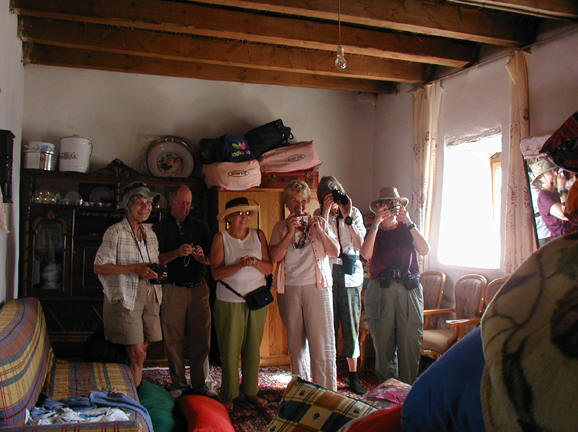

 |
 |
Day 10 Monday Aug.
02, 2004
Iranian border, Noah's Arc, Kizil Kaya
Submitted by Jane Wooley janew@core.com
|
August 2, 2004
I took a short
walk before breakfast. As I walked out along the track past the hotel
restaurant, I passed a dog sitting in front of some houses. As I walked
back to the hotel, there were 5 or 6 dogs and they were NOT going to let
me pass. They did not bite, but they nipped and jumped up to hold me
back.
Noah’s Arc.
According to Meli it is a metaphor for a retreat from corruption. Ararat
is so close to God/heaven. We switched to a minibus to go up there. On
the way there was a woman drying apricots in front of her grove of trees –
her cattle among them – all in front of Ararat. Up by the small Noah’s
Arc National Park Center there is a peace pole, like Nancie’s at home.
For peace pole information consult peacepole.org. The Arc is a clear
formation in the rocks on the side of the hill. We visited the home of
Hassan, the keeper of the Arc. He looks like he could be Noah. He has 4
children and 44 or 45 grandchildren Some of his grandchildren were there
and the oldest granddaughter made us tea.
On the way back to the hotel, we were stopped by the police who checked our tachometer. Hussein had driven more than 8 hours once, and gone over the speed limit 47 times, but they forgave him. Every professional vehicle must have a tachometer. We couldn’t imagine that we could have been speeding at all, but decided it must have been before we joined the bus, when Hussein was driving out from Cappadocia to meet us.
This was the
day and place we were to deliver a small bag of gold to Meli’s sister’s
tiler’s wife who lives in a village on the Iranian border very near
Ararat. We were told that people from the village
The Kurdish village of Kizil Kaya (no dots on the i’s) or Red Rock (or as the road sign said Kizilkaya 7km) was started for the smuggling of animals. It is up an impossibly bad road and it in the no man’s land between Iran and Turkey (but in Turkey). As we drove to it, our guide told us that before the PKK years, the village had 80 cows, but now has 80 sheep – a huge economic hit. They had to get rid of their cows or they would have been attacked. The villagers had to live in the cities for a while. When our guide did his military service, he had to be taken to his posting under heavy protection like a criminal or he would have been killed by the PKK for serving in the Turkish army. The PKK were there relatives, but only a small minority of Kurds. It really hurt the Kurds.
The first thing
we did in the village was go to the home of the wife and deliver the bag
of gold and have tea. The wife and her 4 small children live alone in the
house. The husband had to go to the
This was the first time the children of this village had seen outsiders, much less Americans. A visit of a bus load of strangers to this village was so unusual that the gendarmes came to investigate – the guard in the border watchtower had called them. The women were baking bread in a hole in the ground. They slaughtered an animal (or three) and we watched them cook it. It must have been the freshest meal any of us had ever eaten, everything (wheat, bread, lamb, vegetables, Ayden) completely produced in the village (except the Coke and Fanta). We dined al fresco with a magnificent view of Ararat. The total hospitality was overwealming. Meli said it might be the poorest village in Turkey. It was an eventful day, but tied together by Ararat. From 4:30 to 5:30 when I had my last sight of Ararat from the bus on the way to Van, wherever we were, Ararat was there. For our potty bread on the way to Van, we crossed a suspension bridge by a beautiful waterfall just above Muradiye. Only dire necessity got some of us across that bridge. Sunset over Lake Van with wildflowers.
|